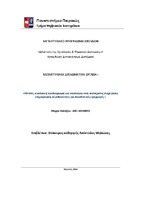Μελέτη, αναλυτική προδιαγραφή και υλοποίηση ενός συστήματος διαχείρισης πληροφορίας περιβάλλοντος για διεισδυτικές εφαρμογές

Προβολή/
Θεματική επικεφαλίδα
Πληροφοριακά συστήματαΛέξεις κλειδιά
Πληροφορία ; Content Management Systems (CMS)Περίληψη
Τα διάχυτα / διεισδυτικά υπολογιστικά περιβάλλοντα (Ubiquitous / Pervasive computing environments) αποτελούν ένα μεγάλο όραμα για το μέλλον και έρχονται να αντικαταστήσουν τις υπάρχουσες υπολογιστικές τεχνολογίες. Σε αυτά τα περιβάλλοντα θα διατίθεται ενσωματωμένη παντού υπολογιστική τεχνολογία τέτοια ώστε να μπορούν να προσαρμοστούν στις ανάγκες μεμονωμένων χρηστών. Τα δίκτυα, οι υπηρεσίες και οι συσκευές θα πρέπει να είναι πανταχού παρόντα και να εργάζονται από κοινού, ώστε να μπορούν να υποστηρίξουν κάθε άτομο για την εκτέλεση δραστηριοτήτων της καθημερινής ζωής του. Αντίστοιχα οι διάφορες διαδικασίες θα πρέπει να εκτελούνται με διαφανή και διακριτικό τρόπο ώστε να μην είναι αντιληπτά από τον άνθρωπο. Οι διαδικασίες που εκτελούνται από το σύστημα θα πρέπει να απαιτούν την ελάχιστη παρέμβαση του χρήστη και να ανταποκρίνονται στις ανάγκες του. Για να μπορέσουν να ανταποκριθούν σε αυτή την μεγάλη πρόκληση, τα περιβάλλοντα αυτά θα πρέπει να προσαρμόζονται αυτόματα με ευφυή τρόπο προκειμένου να παρέχουν πραγματικό όφελος στον χρήστη, αντί να του δημιουργούν εμπόδια.
Για να μπορέσει ένα τέτοιο περιβάλλον να υποστηρίξει τα παραπάνω θα πρέπει πρώτα από όλα να είναι συνεχώς προσβάσιμο το δίκτυο ώστε να είναι αδιάλειπτη η παροχή υπηρεσιών του. Επομένως είναι αναγκαίο να γίνεται αυτόματα η ανακάλυψη και ο εντοπισμός των διάφορα στοιχείων / οντοτήτων του περιβάλλοντος, αλλά και η διαχείριση και διαμόρφωσή τους ώστε να καλύπτουν τις ανάγκες του χρήστη και να εκτελούν διαδικασίες για λογαριασμό του. Οι διαδικασίες αυτές θα πρέπει να λειτουργούν αδιάλειπτα καθώς ο χρήστης κινείται μέσα στο διάχυτο περιβάλλον.
Επιπλέον ένα τέτοιο σύστημα θα πρέπει διευκολύνει τη διαχείριση και την διάχυση της νοημοσύνης του συστήματος μέσα στο περιβάλλον. Συνεπώς θα πρέπει να εκτελούνται διεργασίες που να παρέχουν πολύτιμες γνώσεις περιβάλλοντος (context awareness) για λήψη αποφάσεων συστήματος. Οπότε το σύστημα θα
πρέπει να συλλέγει, να αξιολογεί και να ταξινομεί πληροφορίες του πλαισίου (context) που αφορούν την κατάσταση όλων των οντοτήτων (φυσικών και ιδεατών) που υπάρχουν σε αυτό. Η διαδικασία αυτή ονομάζεται context management και είναι απαραίτητη προκειμένου το σύστημα να μπορεί να αξιοποιήσει τις πληροφορίες που έχει συλλέξει, ώστε να εξάγει συμπεράσματα πιο υψηλού επιπέδου, με τελικό σκοπό να παρέχει προσαρμοσμένες υπηρεσίες (εξατομίκευση υπηρεσιών) στον κάθε χρήστη του συστήματος για συγκεκριμένο τόπο, χρόνο και γεγονότα. Τέλος, καθώς πολλές από τις πληροφορίες που αποτελούν τμήμα της γνώσης που διαθέτει το σύστημα ενδέχεται να αφορούν προσωπικά και ευαίσθητα δεδομένα, είναι σημαντικό να παρέχονται μηχανισμοί διασφάλισης της ιδιωτικότητας του χρήστη.
Στην παρούσα εργασία γίνεται μελέτη, ανάλυση προδιαγραφών και υλοποίηση ενός συστήματος context management. Το SED (Sensor Event Detector) σύστημα παρέχει μηχανισμούς για την λήψη, επεξεργασία, διαχείριση και διάδοση πληροφοριών του περιβάλλοντος. Ο μηχανισμός του συστήματος καταγράφει και διατηρεί τα δεδομένα προκειμένου να υποστούν επεξεργασία και να παρέχουν συμπεράσματα υψηλότερου επιπέδου για την κατάσταση του περιβάλλοντος (context inference). Το SED σύστημα σχεδιάστηκε έτσι ώστε να επιτρέπει σε ένα έξυπνο περιβάλλον να εστιάζει στις εξατομικευμένες ανάγκες των χρηστών και να παρέχει υπηρεσίες πλήρως προσανατολισμένες και προσαρμοσμένες σε αυτούς, σύμφωνα με τις προτιμήσεις, την τοποθεσία, τις συσκευές, το δίκτυο, τις τρέχουσες συνθήκες (χρόνος και φυσικές συνθήκες) και όλες τις πληροφορίες περιβάλλοντος που σχετίζονται με τον κάθε χρήστη.


